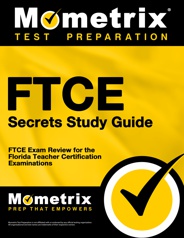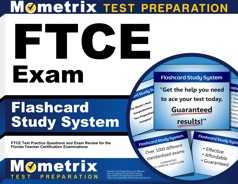The Florida Teacher Certification Exam (FTCE) is a series of content and application-based exams for the state of Florida that provides prospective educators the opportunity to demonstrate their knowledge and skills in general education and subject area knowledge.
The FTCE General Knowledge (GK) test is one of seven exams developed by the state of Florida to reflect the state’s requirements, aligned with the student content standards approved by the Florida State Board.
Click “Start Test” above to take a free FTCE General Knowledge practice test!
FTCE General Knowledge Test Outline
The General Knowledge test is split into four subtests, which you can take all at once or in separate testing sessions. Regardless of how many you take at once, you must pass all four subtests to pass the full exam.
Essay Subtest
For the essay subtest, you will be asked to write a short essay on a given topic. When writing this essay, there are several things that you will be tested on:
- How consistent your point of view is
- How relevant your thesis is
- Your use of college-level English standards
- How effective your sentence patterns are
- How relevant and adequate your textual evidence is
- How well you introduce the topic
- How well you organize your ideas
- How well your concluding statement supports the information presented
English Language Skills Subtest (30 questions)
The questions in this subtest assess your knowledge and skills in three key areas:
- Language structure (33%)
- Vocabulary application (33%)
- Standard English conventions (34%)
Reading Subtest (30 questions)
The questions in this subtest are based on reading passages. You will be asked to read five expository and/or narrative passages and answer the related questions.
You will be tested on your knowledge in three key areas:
- Key ideas and details (40%)
- Text structure and meaning (25%)
- Integration of information and ideas (35%)
Mathematics Subtest (35 questions)
For this subtest, you will be given an on-screen calculator and reference sheet to help with any necessary calculations.
You will be tested on your knowledge and skills in four key areas:
- Number sense, concepts, and operations (25%)
- Geometry and measurement (25%)
- Algebraic thinking and the coordinate plane (30%)
- Probability, statistics, and data representation (20%)

Check Out Mometrix's FTCE Study Guide
Get practice questions, video tutorials, and detailed study lessons
Get Your Study Guide
Registration
To register for the General Knowledge exam, you must first create an online FTCE/FELE account. Once you are logged in, select “General Knowledge (GK) (082)” as your exam. From there, you can register for the exam, pay the $130 testing fee, and schedule your testing appointment.
Test Day
On the day of your exam, you should arrive at the testing center 30 minutes earlier than the scheduled appointment time. Once you arrive, the check-in process will begin. You will be asked to sign in and provide two valid forms of government-issued ID, one of which must be a photo ID.
After the check-in process, you will be asked to place all personal items in a locker outside the testing room, or you may be asked to leave them in your car. If you wear eyeglasses, they will be briefly removed and inspected before you enter the testing room.
Once the test begins, you will be allowed to take breaks. However, the timer will not be stopped during your break, so use your break time carefully.
How the Test is Scored
Your final FTCE score is calculated using a scaled scoring method. This method works by taking the number of questions you answered correctly and converting it to a scaled score. To pass, you will need to achieve a scaled score of at least 200 on each multiple-choice subtest, and you must achieve a score of 8 out of 12 to pass the essay subtest. You must pass all four subtests to pass the exam.
You will receive your official score report within four weeks after testing.
Retaking the Test
If you wish to retake the test, you may do so after waiting 31 calendar days and re-paying the necessary exam fees.
Check Out Mometrix's FTCE Flashcards
Get complex subjects broken down into easily understandable concepts
Get Your Flashcards
FTCE General Knowledge Online Prep Course
If you want to be fully prepared, Mometrix offers an online FTCE General Knowledge prep course designed to give you everything you need to succeed!
Here’s what you’ll find in the FTCE General Knowledge course:
- 90+ Review Lessons Covering Every Topic
- Over 550 FTCE General Knowledge Practice Questions
- 280+ Video Tutorials
- 350+ Digital Flashcards
- Money-back Guarantee
- Mobile Access
Everyone learns differently, so we’ve tailored the FTCE General Knowledge online prep course to ensure every learner has what they need to prepare for the FTCE General Knowledge exam.
Click below to check it out!
FAQs
Q
How many questions are on the FTCE General Knowledge test?
A
There are 95 multiple-choice questions and one essay on the test.
Q
How long is the FTCE General Knowledge test?
A
The time limit for the test as a whole is just over 4 hours.
Q
What is the passing score for the FTCE General Knowledge test?
A
To pass the test, you must achieve a minimum scaled score of 200 on the Reading, Mathematics, and English Language Skills subtests, as well as a score of 8/12 on the essay subtest.
Q
How much does the FTCE General Knowledge test cost?
A
The testing fee is $130 for all four subtests combined.


